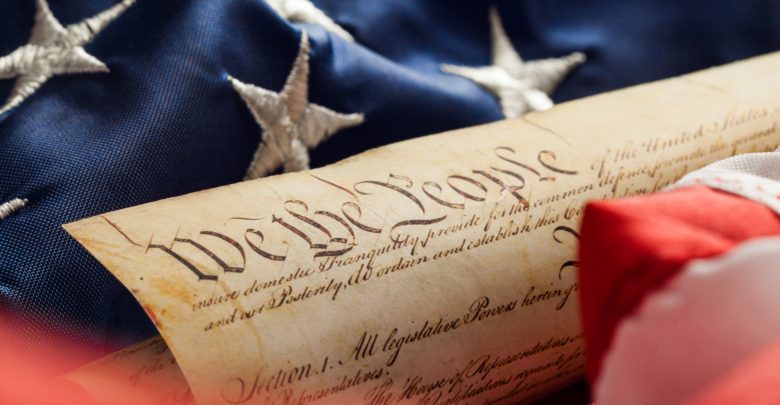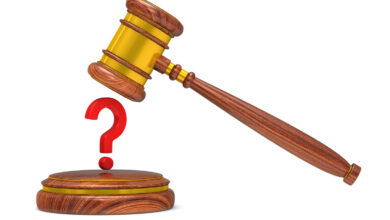The Constitution Can’t Protect U.S. Democracy From Trump

Ever since the day Donald Trump was inaugurated as the 45th president of the United States, the conventional wisdom has been that the checks and balances built into our Constitution would prevent him from doing lasting damage to our democracy.
Yes, he might divide the nation into warring camps, undermine our leadership and respect throughout the world, coarsen our culture, lie endlessly, and make all kinds of policy mistakes, domestic and foreign.
But the Constitution. The other branches of government, Congress and the courts, will surely prevent him from fundamentally changing the way our democracy works.
There is some truth to this conventional wisdom. Our constitutional checks and balances have undoubtedly limited the damage Trump has done to our democracy.
But they haven’t eliminated it, and it is time to recognize that the Constitution isn’t up to the task of protecting our democracy from an aberrant president like Donald Trump.
The entire United States Constitution was handwritten on 4 pages of parchment more than 230 years ago. It contained fewer than 5000 words. Subsequent amendments roughly doubled the length of the Constitution, but they dealt mostly with the rights of citizens, not checks and balances or the separation of powers between the three branches of government.
The brevity of the Constitution is largely responsible for its enduring relevance. It articulates fundamental, immutable principles that define the American experiment without attempting to spell out a minutely detailed, prescriptive set of rules for the implementation of those principles. The framers left the meaning and application of those principles to be shaped by future generations in an ongoing process of interpretation.
With the exception of a handful of shared powers – notably the power of the president to veto legislation passed by Congress and the requirement of congressional advice and consent on treaties and certain presidential appointments – the Constitution says almost nothing about the interplay between the legislative, executive and judicial branches of government. Each branch is given its own domain, but the Constitution doesn’t say what happens when the prerogatives of one branch overlap with or come crashing up against the prerogatives of another.
For instance, the Constitution doesn’t expressly grant Congress the power of oversight over the executive branch, or the authority to compel executive branch officials to testify in order to exercise its legislative mandate. And it doesn’t say that the Supreme Court can declare an act of Congress void if, in the opinion of the Court, it doesn’t pass constitutional muster.
Yet, despite the absence of explicit mention of these powers in the Constitution, they are deeply embedded in our system of government. The gaps have been filled mostly by decisions of the Supreme Court.
For instance, the Supreme Court has long recognized that Congress has constitutional authority to conduct oversight of the executive. The Court has found that the power of Congress to probe into departments of the federal government to expose corruption, inefficiency or waste, while not explicitly granted in the Constitution, is nevertheless inherent in the constitutional grant of legislative authority to Congress.
And even though the Constitution grants all legislative powers exclusively to Congress, the Supreme Court decided over 200 years ago that the judicial branch has the authority to void legislative acts of Congress that don’t pass constitutional muster.
Although we have had our moments of constitutional crisis in which the three branches have clashed over separation of powers, none have seriously threatened our way of government. The Civil War was obviously a cataclysmic event in our history, but to the extent that the Civil War was about separation of powers, it was about the division of power between the federal government and the states, not between the three branches of the federal government.
For the most part, serious damage to our democracy has been avoided by adherence to universally accepted norms of behavior.
For instance, during the Watergate hearings on the impeachment of Richard Nixon, the special prosecutor obtained a subpoena requiring Nixon to turn over tape recordings of Oval Office conversations. Nixon refused. The dispute quickly made its way to the Supreme Court, which unanimously ordered Nixon to turn over the tapes.
Why is dispute over the Nixon tapes remembered as a triumphant expression of the fundamental principle that no man is above the law, rather than as a full-blown constitutional crisis that threatened to tear apart our democracy?
Simple. Because Nixon obeyed the Court’s order. He turned over the tapes.
Almost without exception, that has been the history of the United States. It is a tribute to the strength of our democracy that the Supreme Court has never said what would happen if a president refused to obey a court order. It has never had to. With one or two minor, ancient exceptions, presidents have complied with orders of the Supreme Court, so the Court has never been called upon to decide what would happen if a president didn’t.
But none of this is cast in stone.
There is debate in legal circles about the limits, and even the constitutionality of congressional oversight. And regardless of what the Supreme Court may say about it at any given time, oversight can be frustrated by a president who asserts overreaching claims of executive privilege and orders executive branch officials not to testify or produce documents to congress. Or to lie.
And he might get away with it. Trump already has.
Similarly, the next Nixon (read, Donald J. Trump) might not comply with a Supreme Court order. There is absolutely no guarantee that a president who is hostile to norms that have historically inhibited deviant presidential behavior, acting under legal cover from a monarchical attorney general, and enabled by a judiciary created in his own image won’t simply insist that the Constitution doesn’t require a president to kowtow to any court.
And he might get away with it. Who’s going to stop him?
If a president were to refuse to comply with an order of the Supreme Court, there would be nobody to enforce compliance and no higher authority to appeal to.
The only possible remedy would be impeachment. But we’ve seen how that goes: So long as the likes of Bill Barr, Pat Cipollone, and Alan Dershowitz can come up with fringe legal theories that a president is not subject to orders from another branch of the government, or that there’s no crime involved other than possibly the low crime of contempt of court, hyper-partisan senators of the president’s party will do everything they can to see that a president isn’t removed from office.
In other words, crying “But the Constitution!” doesn’t solve the problem. And even if we never reach the point where a president defies a court order, Trump has already inflicted a parade of horribles on our democracy for which the Constitution contains no obvious answer. To name a few:
- Separating children from their families and keeping them in cages
- Praising and encouraging racists and white supremacists
- Making racist statements and spreading racist memes
- Compulsively lying about everything
- Appointing manifestly unqualified persons to cabinet level positions
- Placing political acolytes in positions designed to be independent
- Calling for criminal investigations and jailing of his political adversaries
- Rewarding friends, family and supporters with preferential legal treatment
- Interfering in active cases in the criminal justice system
- Retaliating against whistleblowers
- Granting pardons to political friends without any formal process
- Dangling pardons for witnesses if they don’t cooperate with the government
- Inviting foreign interference in U.S. elections
- Offering foreign governments to trade public acts for personal favors
- Spreading manifestly false rumors about adversaries and critics
- Asserting frivolous claims of executive privilege
- Blurting out classified information to our adversaries
The Constitution doesn’t expressly prohibit any of this.
Yes, we could theoretically amend the Constitution to require presidents to comply with orders issued by the Supreme Court, shield the Department of Justice from political interference, clarify the grounds for impeachment and removal, or pretty much anything we can think of. But that’s not going to happen. Amending the Constitution requires a two-thirds vote in both the House and the Senate (or a constitutional convention, which has never happened since the Constitution itself was created), followed by ratification by three-fourths of the states. There have been only two amendments in the last 50 years, one lowering the voting age to 18 and the other dealing with the compensation of representatives and senators. A ratified amendment mandating sweeping changes in the separation of constitutional powers is just short of impossible.
Congress could enact laws that seek to accomplish the same ends, but they would likely be vetoed or declared by Trump-appointed judges to be unconstitutional encroachments on executive authority. Or simply ignored.
And the courts could interpret the Constitution in a way that limits presidential power, but that’s highly unlikely with the current composition of the Supreme Court. And even if the Court were to try to limit presidential power beyond what is expressly stated in the Constitution, we’d simply be back where we started: who’s going to enforce court orders against a president who believes he isn’t legally bound by them?
That leaves us with only one unambiguous constitutional provision that can get us out of this mess: the requirement of a presidential election every four years.
If Trump is a one-term president and his successor restores norms of decent, restrained presidential behavior, history may write off the Trump years as an aberration.
But if Trump is re-elected, all of his aberrant behaviors will have been ratified by the American people.
That will make them the new norm.
And that, more than any dispute about policy or fitness for office, is what the 2020 election is all about.





Bravo, Philip!